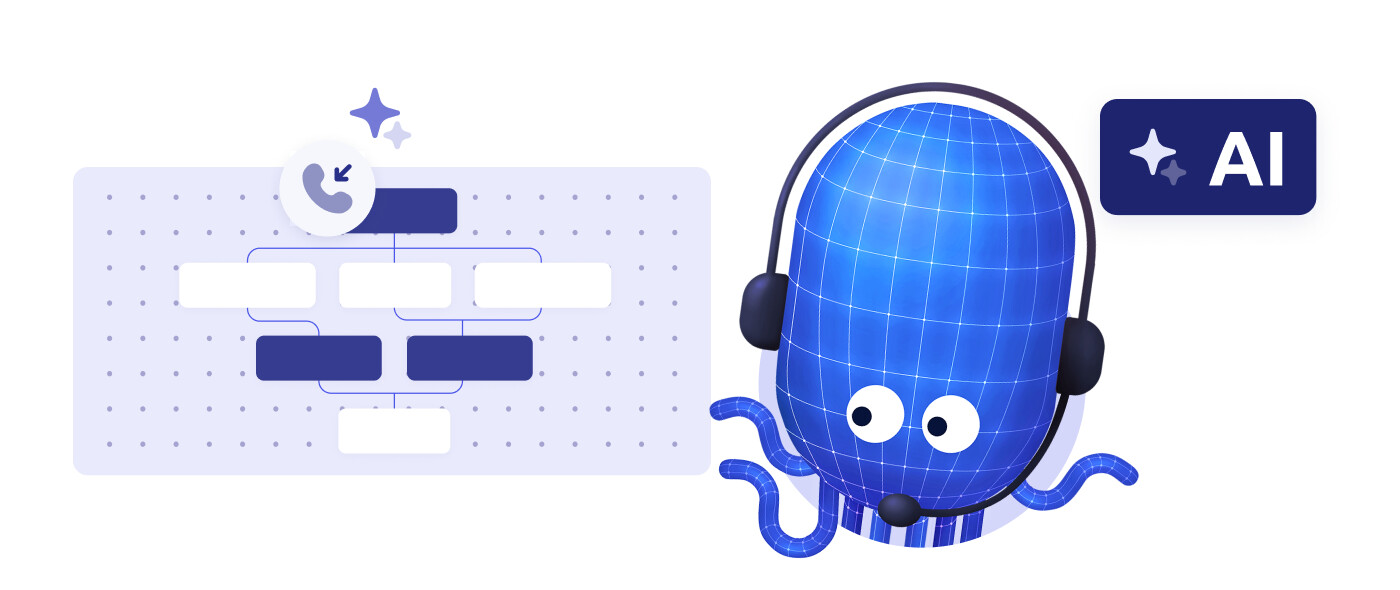When workflows go wrong: the hidden cost of inefficiency

Repetitive tasks drain your agents—and your ROI
Agents in outdated environments spend excessive time hunting for information across different systems or retyping existing data. These repetitive actions don’t improve the customer experience and don’t reward the agent either. The longer they spend on these low-value tasks, the less time they have for more impactful work. Every wasted minute adds up and directly affects the bottom line.
Overwhelmed agents, rising errors, and runaway turnover
Workflows that are too rigid or poorly integrated lead to frequent mistakes. Agents forget steps, overlook callbacks, or get lost in disconnected systems. This daily stress undermines motivation and often causes new hires to disengage early on. High turnover and mounting training costs follow, while service quality gradually declines. A broken workflow is more than a technical issue—it’s a performance and wellbeing issue at every level.
Free your agents: automate what slows them down with smart workflows
Fast-track efficiency with smart workflows
Call center smart workflows vary, and some processes are better suited for automation. Interactive voice response (IVR) systems can collect caller data and connect them to the right person based on specific rules. Real-time dashboards can display relevant stats to agents as they work. After a call, the system can send a follow-up email or launch a customer satisfaction survey. Outbound campaigns can be automatically scheduled based on client behavior or profile. All of this contributes to smoother operations and lets agents focus on more strategic conversations.
No-code tools bring automation to the front line
Today, automation is no longer limited to developers. No-code platforms enable teams to build and adjust workflows easily using drag-and-drop interfaces and connectors. Tools like Diabolocom embed these capabilities directly, combining flexibility with deep industry relevance. Modern call centers don’t run on a single static process—they rely on adaptable smart workflows that evolve with the context, whether it’s handling a spike in call volume, managing post-sale support, or running marketing outreach. The ability to manage multiple workflows in real time is key to staying responsive and efficient.
Smarter with AI: empowering agents in real time with smart workflows

From repetitive tasks to real insights: what AI brings to the table
AI improves workflows beyond basic automation. It can detect customer intent using semantic analysis, even when it’s not explicitly stated. Based on those AI-driven insights, it can prioritize calls, adapt tone recommendations, or launch predefined actions. After the conversation, AI can generate structured summaries to reduce after-call work. For quality assurance, AI analyzes how calls are handled—wording, pacing—and helps flag deviations for feedback. Voice Analytics solutions go deeper by interpreting the voice itself as data, classifying interactions by type and identifying early signs of friction or dissatisfaction. In real time, AI can also suggest tailored responses or relevant articles from the knowledge base, allowing agents to focus on delivering personalized support.
Happier agents, better results: the wellbeing impact of AI
Reducing copy-paste tasks and tool-switching has a major impact on agent wellbeing. With AI managing routine steps, agents can stay focused on real customer needs. They’re less stressed, more attentive, and better equipped to handle complex situations. In this way, AI helps human agents shine by letting them concentrate on what they do best—building real connections with customers.
Real-life Case: Automation and Generative AI Boosting Culligan’s Productivity
Culligan, a global leader in water treatment solutions, leveraged Diabolocom’s generative AI to automate its customer service workflows and significantly improve efficiency. By automating voicemail processing, Culligan reduced handling time by 50%, allowing agents to focus on higher-value tasks. This automation not only boosted agent productivity but also enhanced employee satisfaction by eliminating repetitive tasks.
Moreover, Diabolocom’s AI solution refined Culligan’s customer relationship management by analyzing NPS feedback more effectively. The system not only flags dissatisfied customers but also highlights potential areas for improvement in positive feedback, leading to a more proactive approach to customer service.
Culligan successfully integrated the AI solution with its existing tools, ensuring a smooth transition and rapid adoption. The results were clear: increased customer satisfaction with an NPS of 75 and improved operational efficiency.
Future-proofing your operations with modern CCaaS platforms
Build smart workflows—without writing a single line of code
At the core of an automated call center lies a flexible platform. The best CCaaS providers, such as Diabolocom, offer AI-powered tools for building smart workflows that reflect your actual business needs. Operational leaders can design call flows with real-time actions like CRM updates, agent routing based on availability, or dynamic triggers tied to customer tags. Everything can be modified on the fly, keeping your processes aligned with shifting priorities—whether it’s seasonal sales, onboarding for a new product, or launching a new support channel.
Stay agile with cloud-native, AI-ready infrastructure
These platforms aren’t just call handling tools—they’re full ecosystems built for adaptability. With a cloud-native foundation, they deliver high availability and ensure performance during call surges. AI is built-in and not bolted on. And the most effective AI in these instances is from models specifically designed for CcaaS needs. That means your workflows can include conditional steps, support omnichannel orchestration, and use predictive analytics to anticipate needs. Based on the type of request, the contact method, or the customer’s profile, the system automatically chooses the right workflow path. This kind of smart orchestration eases the pressure on teams and keeps the customer experience consistent—no matter the volume or complexity.
Conclusion: Streamlined smart workflows mean smoother experiences for all
Workflows shape how agents work, how customers experience your service, and how efficiently your business operates. A smart, flexible workflow minimizes friction and maximizes clarity—for everyone involved. For customers, this leads to quicker answers and seamless service. For agents, it means less stress and more time to focus on what really matters. Automation and AI aren’t there to replace people—they’re there to support them. And platforms like Diabolocom bring it all together: voice, data, AI, and automation in one centralized solution, empowering teams to deliver better, faster, more human service.
Improve performance with smart workflows



